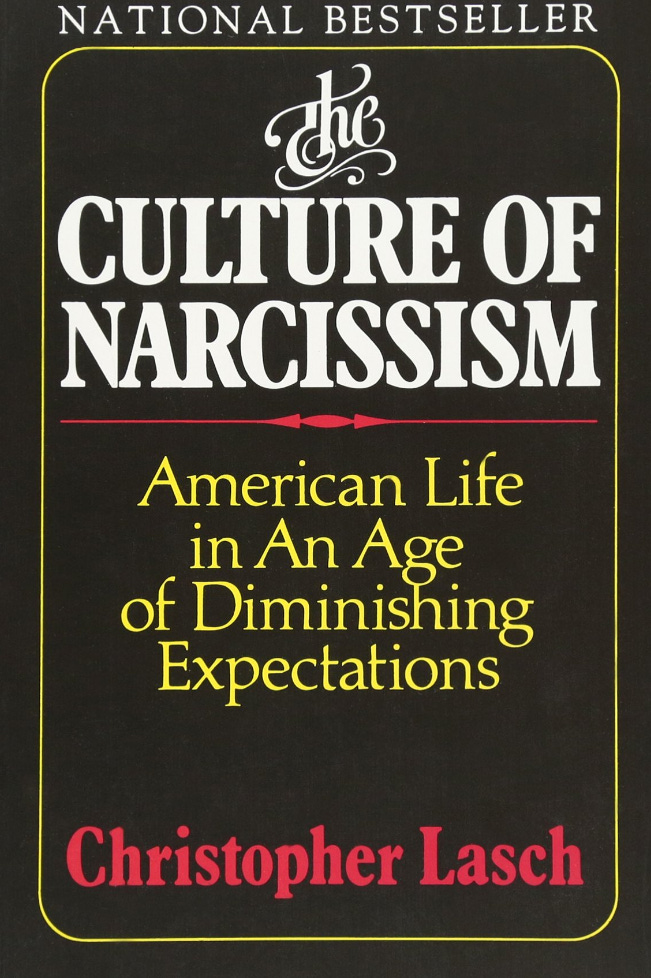17 January 2021 — TK News
Forty years ago, Christopher Lasch described a soulless society headed toward a “war of all against all.” Are we there? A look back at the book TK readers chose for review
It is symptomatic of the underlying tenor of American life that vulgar terms for sexual intercourse also convey the sense of getting the better of someone, working him over, taking him in, imposing your will through guile, deception, or superior force. — Christopher Lasch, The Culture of Narcissism
Back in 1979, social critic Christopher Lasch wasn’t buying the idea that Americans in the sex-drugs-and-disco era were actually having fun.
“This hedonism is a fraud,” he wrote. “The pursuit of pleasure disguises a struggle for power. Americans have not really become more sociable and cooperative… they have merely become more adept at exploiting the conventions of interpersonal relations for their own benefit.”
Lasch’s reasoning traced to the beginning of American society.
The Puritans embraced the idea of getting rich, but “saw personal aggrandizement as incidental to social labor” and “instructed men who prospered not to lord it over neighbors.” Puritans gave way to Yankees and their Protestant work ethic, which imagined prosperity as a reward for hard work, but also for “self-discipline, the training and cultivation of God-given talents, above all the cultivation of reason.”
A century later, the ideal of self-improvement gave way to what Lasch called a “cult of competitive industry,” as people like P.T. Barnum began to evangelize a more brutally self-interested version of the Ben Franklin Yankee ethos. The new idea was to strive for worldly success “without Franklin’s concern for the attainment of wisdom.” Instead of pursuing an abstract goal of discipline and self-denial, American society became more openly organized around competing and beating one another to the top.
In the twentieth century, mass media promoted a new religion of self-care that stressed turning one’s whole self into an engine of such competitive ascent. People gobbled up magazine articles about “the art of conversation,” fashion, and “culture,” as the “management of interpersonal relations came to be seen as the essence of self-advancement.” New stresses on “winning friends and influencing people” replaced the old ideals of self-discipline and thrift, leading, as Lasch put it, to a stage of history where “the pursuit of wealth lost the few shreds of moral meaning that still clung to it.”
By the sixties and seventies, America became an intrinsically performative society, a vast population that didn’t particularly distinguish between public and private life, for whom image was as important as inner reality. Even foreign policy was understood as an effort to manipulate how other nations perceived us. One of the creepier revelations of the Pentagon Papers was that we waged war in places like Vietnam with an eye out for how our actions would be perceived by what political leaders called “relevant audiences,” e.g. the Communists, the South Vietnamese, America’s Western allies, and the American public.
As society at home became more organized around corporate climbing, our lives became an endless, round-the-clock effort to “excite admiration or envy,” where everything from “assertiveness therapy” to jogging to est helped the individual be better armed in the struggle for personal advancement.
This, apparently, is what Christopher Lasch saw when he looked at Americans grooving to Saturday Night Fever. These were not groups of people letting loose and having fun. They were lonely people grinding away the anxiety of life in a market-based society stripped of all ameliorative restraints, where “pleasure becomes life’s only business” in a dystopian “war of all against all.” In such a society, a narcissistic orientation isn’t deviance or illness, but a crucial adaptive strategy, with the unfortunate side-effect mentioned above: a growing inability to see the words fuck and fuck over as having different meanings.
I started to spot reporters reading The Culture of Narcissism on the campaign trail in 2015. It was one of many books press folk began speed-reading at the beginning of the Donald Trump presidential run. Others included the historical analysis The Paranoid Style in American Politics(written by one of Lasch’s mentors, Richard Hofstadter) and Hannah Arendt’s The Origins of Totalitarianism. Any tracts about narcissism or cults of personality were gobbled up as fodder for Trump analyses.
I avoided those and instead read up on corporate sales and businesses like pro wrestling, because Trump was speaking a language I didn’t understand that apparently came from places like that. Reading The Culture of Narcissism now, it’s clear it’s very much worth reading, but anyone who does so in search of a narrow explanation for Trump is sure to be disappointed.
This is a seething, complicated book that hurls razor blades in all directions, and seems almost to have been written with the specific intent of avoiding appropriation by political opportunists. Lasch is often bitterly condemned by ideologues on both the right and the left, who seem determined to put him in more comprehensible boxes, even if he doesn’t really fit in any.
This is an excerpt from today’s subscriber-only post. To read the entire post and get full access to the archives, you can subscribe for $5 a month or $50 a year.

